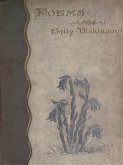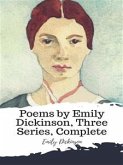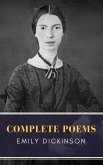PREFACE
The eagerness with which the first volume of Emily Dickinson's poems has been read shows very clearly that all our alleged modern artificiality does not prevent a prompt appreciation of the qualities of directness and simplicity in approaching the greatest themes,—life and love and death. That "irresistible needle-touch," as one of her best critics has called it, piercing at once the very core of a thought, has found a response as wide and sympathetic as it has been unexpected even to those who knew best her compelling power. This second volume, while open to the same criticism as to form with its predecessor, shows also the same shining beauties.
Although Emily Dickinson had been in the habit of sending occasional poems to friends and correspondents, the full extent of her writing was by no means imagined by them. Her friend "H.H." must at least have suspected it, for in a letter dated 5th September, 1884, she wrote:—
MY DEAR FRIEND,— What portfolios full of verses you must have! It is a cruel wrong to your "day and generation" that you will not give them light.
If such a thing should happen as that I should outlive you, I wish you would make me your literary legatee and executor. Surely after you are what is called "dead" you will be willing that the poor ghosts you have left behind should be cheered and pleased by your verses, will you not? You ought to be. I do not think we have a right to withhold from the world a word or a thought any more than a deed which might help a single soul. . . .
Truly yours,
The eagerness with which the first volume of Emily Dickinson's poems has been read shows very clearly that all our alleged modern artificiality does not prevent a prompt appreciation of the qualities of directness and simplicity in approaching the greatest themes,—life and love and death. That "irresistible needle-touch," as one of her best critics has called it, piercing at once the very core of a thought, has found a response as wide and sympathetic as it has been unexpected even to those who knew best her compelling power. This second volume, while open to the same criticism as to form with its predecessor, shows also the same shining beauties.
Although Emily Dickinson had been in the habit of sending occasional poems to friends and correspondents, the full extent of her writing was by no means imagined by them. Her friend "H.H." must at least have suspected it, for in a letter dated 5th September, 1884, she wrote:—
MY DEAR FRIEND,— What portfolios full of verses you must have! It is a cruel wrong to your "day and generation" that you will not give them light.
If such a thing should happen as that I should outlive you, I wish you would make me your literary legatee and executor. Surely after you are what is called "dead" you will be willing that the poor ghosts you have left behind should be cheered and pleased by your verses, will you not? You ought to be. I do not think we have a right to withhold from the world a word or a thought any more than a deed which might help a single soul. . . .
Truly yours,









